Categories
Archives

The IPTC Video Metadata Working Group is proud to release the latest version of its mapping standard, Video Metadata Hub. Version 1.3 was approved by the IPTC Standards Committee on 13 May 2020.
“We are pleased to release the new version of IPTC Video Metadata Hub,” said Pam Fisher, Lead of the Video Metadata Working Group. “The changes bring improved clarity, add compatibility with and mapping to EIDR (Entertainment ID Registry), and update the mapping to EBUcore for 2020. These changes are part of our commitment to friction-free adoption across all sectors of the media landscape, supporting video interchange.”
Video Metadata Hub includes two components: a core set of recommended metadata properties to be used across all video content, and mappings that show how to implement those core properties in a series of other video standards, including Apple Quicktime, MPEG-7, Sony XDCAM MXF and SMPTE P2 from Panasonic, Canon VideoClip XML, XMP, IPTC Photo Metadata and NewsML-G2, PBCore, schema.org, In VideoMetadataHub 1.3 we now add a mapping to EIDR Data Fields 2.0.
All feedback on Video Metadata Hub should be directed to the public discussion group at https://groups.io/g/iptc-videometadata.
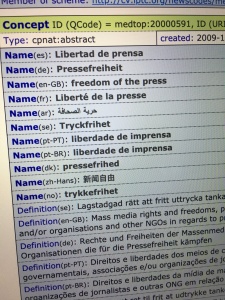 The IPTC NewsCodes Working Group has been very busy in the last six months. At the IPTC Spring 2020 Meeting, we announced three new language translations of our core Media Topics vocabulary, many term updates, and a new NewsCodes Guidelines document.
The IPTC NewsCodes Working Group has been very busy in the last six months. At the IPTC Spring 2020 Meeting, we announced three new language translations of our core Media Topics vocabulary, many term updates, and a new NewsCodes Guidelines document.
Thanks to Ritzau, we added Danish translations of Media Topics in March. Since then we have also added Chinese (Simplified) translations of Media Topics, with great thanks to the team at Xinhua News Agency. We also received a contribution of IPTC Media Topics in Norwegian from NTB.
You can see HTML browsable versions of the new languages here:
As usual, IPTC Media Topics (and all other NewsCodes vocabularies) are available in SKOS format (RDF/XML and Turtle) as well as HTML and as NewsML-G2 Knowledge Items.
The Working Group has also made some updates to the vocabularies based on suggestions from Ritzau, Xinhua and NTB and also some fixes (such as removing duplicate wikidata mappings) suggested by ABC Australia. As with all of our MediaTopics updates, we have not changed the meaning of any existing terms, but we add new terms, clarify the meaning of terms and move terms to put them in more appropriate places in the hierarchy.
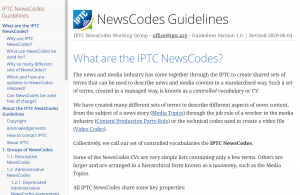 We have also developed the NewsCodes Guidelines document, which explains what are the IPTC NewsCodes, how we decide whether to add new terms, how the NewsCodes are maintained and how you can contribute suggestions. We welcome comments and suggestions on the guidelines document, please get in touch via the public iptc-newscodes@groups.io discussion group with your thoughts.
We have also developed the NewsCodes Guidelines document, which explains what are the IPTC NewsCodes, how we decide whether to add new terms, how the NewsCodes are maintained and how you can contribute suggestions. We welcome comments and suggestions on the guidelines document, please get in touch via the public iptc-newscodes@groups.io discussion group with your thoughts.
And finally, we have made some updates to the Genre NewsCodes vocabulary, to include some suggestions from members plus some suggestions based on our work with the Trust Project and the Journalism Trust Initiative. We have added genres for Fact Check, Satire, Sponsored content and more. Please see the genres vocabulary at http://cv.iptc.org/newscodes/genre/.
Previously, we shared that Google was making image credits and usage rights information more visible on Google Images. Google now displays information about image copyright and ownership details, alongside creator and credit info, when websites and photo-owners make that information available for Google to crawl. Since the announcement there has been steady growth in the amount images containing these embedded metadata fields, which in turn has helped drive greater user awareness of copyright for images on the internet.
Up to now, users have seen the IPTC metadata information when they click on the “Image Credits” link in the “Google Images viewer” – the panel that appears when a user selects an image. Starting from today, users will begin to see this information directly in the viewer, making this rights-related information even more visible.
You can see an example of what this looks like below:
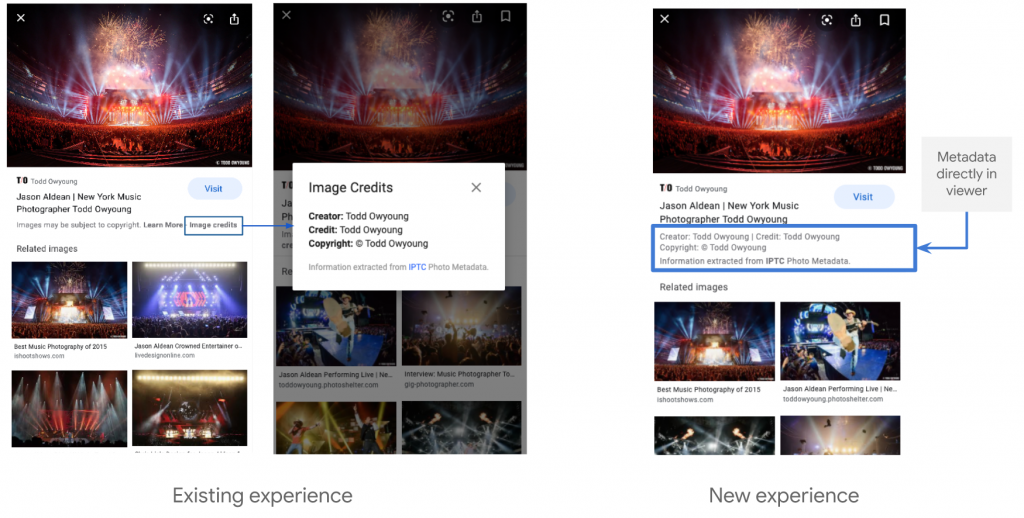
The Google Images team has said in a statement: “We are committed to helping people understand the nature of the content they’re looking at on Google Images. This effort to make IPTC-related information more visible is one more step in that direction.”
For more information on how you can embed rights and credits metadata in your photos, please see our Quick Guide to IPTC Photo Metadata and Google Images.
If you create photo editing or manipulation software and are looking for more information, please consult the Quick Guide or contact us for more information and advice.
We are very happy to continue working with Google and our partner organisation CEPIC on this and other developments in this area. We look forward to making an announcement about the launch of the related “Licensable Images” feature over the summer.
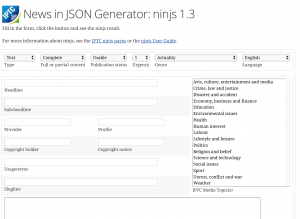
At last week’s Spring Meeting IPTC updated the News in JSON standard (ninjs) to version 1.3. The JSON schema of the new version can be accessed at https://www.iptc.org/std/ninjs/.
The updated schema now has support for trust indicators, genre, other types of headlines and a way for providers to enter their own alternative IDs.
Version 1.3 is backwards-compatible with previous versions of ninjs and makes no breaking changes.
It includes the following new properties and structures:
- genre follows the structure of other objects in ninjs with the possibility to add a code, a name and a reference to a scheme of the code to indicate the genre of the news item.
- trustindicator is also an object with properties to indicate and point at documents describing the providers status according to defined trust indicators. Read more about trust indicators here.
- There has been a demand for other types of headlines, such as “subhead” or “mobile headline”. The original headline property is still in the schema. But in version 1.3 it is now accompanied by a headline_ construct which works in the same manner as body_ and description_. Providers can now add other types of headlines and name them to indicate format and/or type.
- altid is a property that is open to the provider’s own definition of both names and types of sub-properties. That way providers can include alternative IDs as they originally appeared.
- The 1.3 schema also includes a $standard object which contains properties for name, version and reference to the schema that the item follows. This is not (yet) supported in software tools but the idea is that tools could look up the schema for which a document is written, similarly to the way that XML allows users to state the XML Schema that should validate a document.
The user guide, sample generator and GraphQL sample have all been updated according to the 1.3 additions.
ninjs 1.3 will soon be included in the SchemaStore.org JSON Schema repository, to aid with editing and validation of ninjs 1.3 files in a range of popular code editors such as Visual Studio Code and Visual Studio 2013+, IntelliJ IDEA, PyCharm and PHPStorm.
For more information, please see:
- The ninjs GitHub repository
- ninjs example documents
- The ninjs User Guide
- The ninjs 1.3 JSON Schema specification
If you have any questions or comments, please contact the News in JSON Working Group via the public ninjs discussion group, or contact IPTC via the Contact Us form.
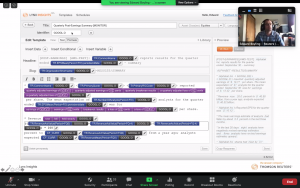
Last week IPTC did something we had never tried before: we ran a complete three-day member meeting virtually, using videoconferencing, which worked very well! Thanks to all our participants and presenters.
Spread over three days, over 50 attendees from the majority of IPTC member organisations across 16 countries heard over 20 presentations from IPTC Working Groups, IPTC member organisations and invited speakers on topics from AI-generated stock photography to tracking entities in news stories. The culmination of the event was the approval of new versions of ninjs, NewsML-G2 and Video Metadata Hub, and the (re-)election of Robert Schmidt-Nia as Chair of IPTC.
Monday: Photo Metadata, Sport and Web Publications
Monday set the tone with an introduction from IPTC Managing Director Brendan Quinn, and introductions from all attendees. Michael Steidl gave the first Working Group update as Lead of the Photo Metadata Working Group, covering the group’s wide-ranging work over the past six months including releasing the Photo Metadata Standard 2019.1 including Image Regions, plus partnership projects with Google on exposing embedded IPTC Photo Metadata fields in search results, and emerging work with camera industry association CIPA and schema.org.
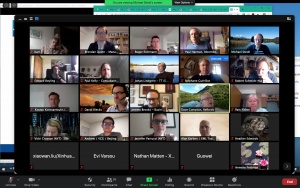
Laurent Le Meur, previous IPTC board member and currently CTO at EDRLab, gave a thought-provoking presentation on W3C Web Publications spec and how it might apply to the news publishing industry. Paul Kelly, lead of the Sports Content Working Group presented his group’s investigations into semantic modelling for sports content, looking at existing sports models and current projects investigating schema.org and semantic / linked-data modelling of sports information, which will feed in to an upcoming version of SportsML.
Tuesday: NewsML-G2, ninjs, Robojournalism, AI, Blockchain, Trust and Video
Tuesday was a busy day: we started with Dave Compton from Refinitiv, lead of the NewsML-G2 Working Group, presenting the group’s latest work including their proposal for NewsML-G2 2.29. Johan Lindgren of TT and lead of the News in JSON Working Group presented a proposal for ninjs 1.3, including many updates suggested by users and the community.
Ed Boyling of Thomson Reuters demonstrated a tool called Lynx Insights that is used by TR to generate news stories based on a rich set of rules defined by journalists. After a rule is created, an incoming news event (such as a company publishing a set of financial results) can automatically be converted to a readable story published on the wire within seconds.
Tao Chen of 500px (part of IPTC member Visual China Group) and lead of the AI Expert Group presented their latest work on AI for images, including automatic quality detection, face anonymisation, subjective feature detection (photos about “happiness” or “romance”), moving from simple face detection to age, gender and celebrity detection, automatic cutouts and more.
Angelo Marrara of ANSA and some project colleagues from EY presented their work on ANSACheck, a way of ensuring that content matches what the agency originally published using blockchain technology. The project has launched and you can see the tool embedded on ANSA’s pages.
Brendan Quinn presented IPTC’s latest work on trust and credibility in the news, including the IPTC Trust and Credibility Guidelines document draft that was published recently.
Finally, Pam Fisher of the Video Metadata Working Group presented the group’s proposal for Video Metadata Hub version 1.3, an update to clarify and simplify some points and take on some suggestions from the community.
Wednesday: NewsCodes translations, Entities, Standards Committee and IPTC Election
Wednesday started off with Jennifer Parrucci of New York Times, lead of IPTC’s NewsCodes Working Group, presenting the group’s work since the last meeting, announcing translations of the core Media Topics controlled vocabulary into Danish, Simplified Chinese and Norwegian. We now publish Media Topics in 11 languages!
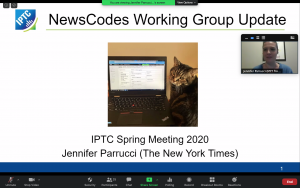
Christoffer Nilsson of new IPTC member iMatrics and Joacim Ståhl of Elysium AI (part of TT) both gave presentations on their work on extracting entities (people, places, organisations and objects) from news content, and we discussed the possibility of working as a group on an industry-wide “news entities” database.
The Spring 2020 IPTC Standards Committee Meeting was led by Stéphane Guérrilot of AFP, Chair of the Standards Committee. The first part of the meeting was a wide-ranging discussion on “how to make IPTC standards easier to use”, which will lead to some interesting projects in the next few months on documentation, marketing materials, and open source software. The second part of the meeting was the formal IPTC member vote on the proposed new standard versions: we are pleased to say that ninjs 1.3, NewsML-G2 2.29 and Video Metadata Hub 1.3 were all approved!
Finally we held a General Meeting of IPTC voting Members, during which Robert Schmidt-Nia of DATAGROUP Consulting Services was elected as IPTC Chair. We also voted through a change to IPTC’s official Articles of Association, introducing a new membership category. More on this in coming weeks!
Thanks again to everyone who made our first fully virtual member meeting such a a great success!
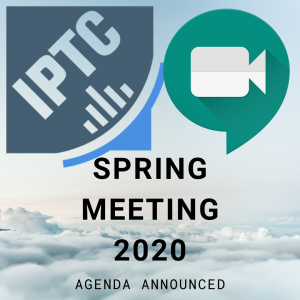 The agenda for the IPTC Spring Meeting (May 11 – 13 2020) has been announced, featuring a focus on news automation.
The agenda for the IPTC Spring Meeting (May 11 – 13 2020) has been announced, featuring a focus on news automation.
Brendan Quinn, Managing Director of IPTC, says “we are very excited to host the first virtual meeting of IPTC. All members are encouraged to attend via Zoom video conferencing, and we hope that many members who find it difficult to travel to the face-to-face meetings will take the opportunity to attend the online meeting.”
Presentations and topics for discussion will include:
- Ed Boyling of Thomson Reuters will present their Lynx Insight system which blends human and machine insights for news creation. Tao Chen of 500px / Visual China Group, Lead of IPTC’s AI Expert Group will present on 500px’s work on AI stock photos. Claudia Quinonez of Bloomberg will give a presentation on “Deep Data-driven Stories”
- Presentations and discussion on metadata entities with Fredrik Lundberg of iMatrics and Joacim Ståhl from TT
- Updates from IPTC Working Group leads on the latest proposed updates to ninjs, NewsML-G2 and Video Metadata Hub, and voting on the proposals by the IPTC Standards Committee
- The latest work of the Photo Metadata Working Group, including recent work with Google on surfacing embedded copyright and licensing metadata in Google Image Search results
- A presentation from W3C Web Publications working group on the Web Publications standard
- Updates on IPTC’s recent work on the Google News Initiative project C-POP and on our work on expressing trust and credibility indicators in news content
The meeting will be held on the originally planned days — Monday 11th through to Wednesday 13th May 2020 — but will take place over five hours each day so attendees still have some time to do other work if necessary.
Attendance is free for all IPTC members. Members should sign up at the members-only registration page to be sent an invitation link.
There is still time to join IPTC to attend the meeting. If you are interested in joining IPTC, please see the join IPTC page.
The IPTC Board was looking forward to having a meeting in Tallinn, Estonia, and hopes that we will be able to have an in-person meeting in Tallinn in coming years.
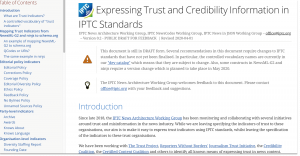
At the IPTC Autumn Meeting in Toronto in 2018, IPTC considered the issues of “trust and credibility” in news media. We looked at the existing initiatives and considered whether IPTC could contribute to the space.
We concluded that some existing efforts were doing great work and that we should not create our own trust and credibility standard. Instead, our resources could best be put towards working with those groups, and aligning IPTC’s standards — particularly our main news standards NewsML-G2 and ninjs — to work well with the outputs of those groups.
Since that time, the IPTC NewsML-G2 Working Group has been collaborating with several initiatives around trust and misinformation in the news industry. We have been working mainly with The Trust Project and the Journalism Trust Initiative from Reporters Without Borders, but have also been in communication with the Credibility Coalition, the Certified Content Coalition and others to identify all known means of expressing trust in news content.
Our aim is to make it easy for users of NewsML-G2 and ninjs to work with these standards to convey the trustworthiness of their content. This should make it easier for news publishers to translate trust information to something that can be read by aggregator platforms and user tools.
In particular, we want to make it as easy as possible for syndicated content to be distributed and published in alignment with trust principles.
A new IPTC Guideline document
To that end, we are publishing a “public draft” of a new IPTC guideline document: Expressing Trust and Credibility Information in IPTC Standards. While not complete, we hope that it helps IPTC members and other users of our standards to understand how they can express trust indicators.
To go along with the draft, we are proposing some changes to existing IPTC standards, including updates to NewsML-G2 and to ninjs, and a new Trust Indicator taxonomy created as part of the IPTC NewsCodes.
New Genres in NewsCodes and changes to NewsML-G2 and ninjs
To accommodate the new work, we will be adding some new entries to the NewsCodes Genre vocabulary. Some genres required for this work such as “Opinion” and “Special Report” were already in the genres vocabulary, but we are proposing to add new genres including “Fact Check” and “Satire“, and some genres to handle sponsored content: Advertiser Supplied, Sponsored and Supported.
We will also be making some small changes to the existing ninjs and NewsML-G2 standards to accommodate some new requirements, such as being able to associate a publisher with another organisation, to indicate membership of The Trust Project, Journalism Trust Initiative or a similar group.
From trusted agency to publisher and then to a user
By following the guidelines, a news agency can add their own trust information to the news items that they distribute. A publisher can then take those trust indicators and convert them to the standard schema.org markup used to convey trust indicators in HTML pages (initially created via a collaboration between schema.org and The Trust Project in 2017).
The schema.org markup can then be read by search engines, platforms such as Facebook, and specialised trust tools such as the NewsGuard browser plugin, so that users can see the trust indicators and decide for themselves whether they can trust a piece of news.
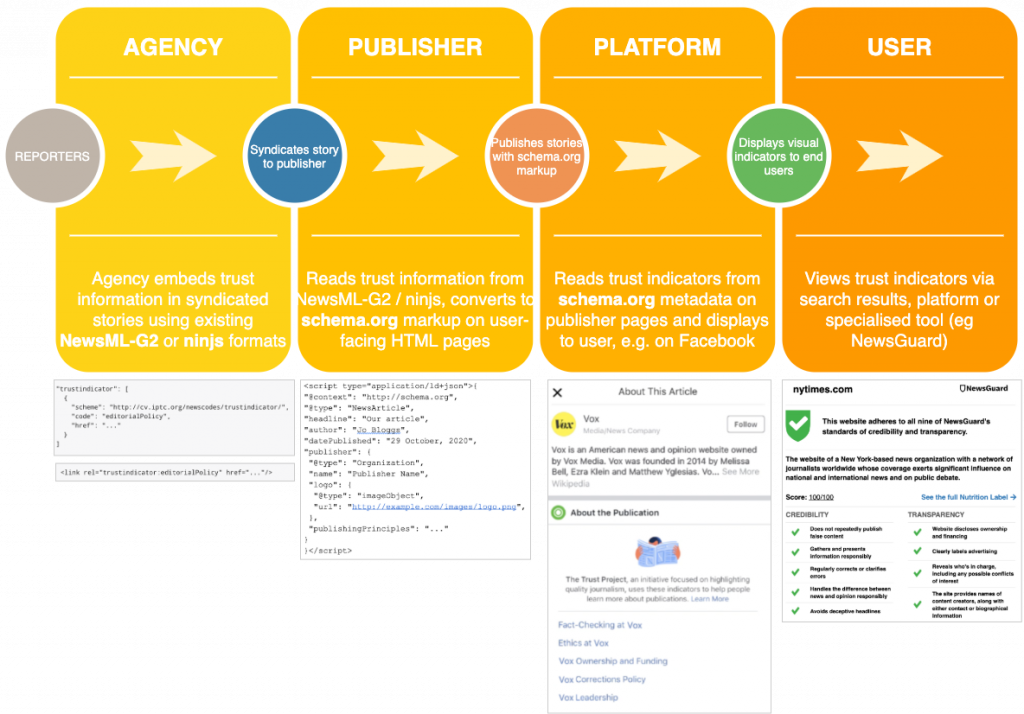
Please give us your feedback
The document will not be final until after those changes have been approved by IPTC members at our next meeting in May.
We have published the draft to ask for feedback from the community about how we could improve our guidance, ask for any trust indicators that we have missed, and to ask for implementation feedback.
Please use the IPTC Contact Us form to send your feedback.
About the Trust Project
The Trust Project is a global network of news organizations working to affirm and amplify journalism’s commitment to transparency, accuracy and inclusion. The project created the Trust Indicators, which are a collaborative, journalism-generated standard for news that helps both regular people and the technology companies’ machines easily assess the authority and integrity of news. The Trust Indicators are based in robust user-centered design research and respond to public needs and wants.
For more information, visit thetrustproject.org.
The Trust Project is funded by Craig Newmark Philanthropies, Democracy Fund, Facebook, Google and the John S. and James L. Knight Foundation.
About the Journalism Trust Initiative
The Journalism Trust Initiative aims at a healthier information space. It is developing indicators for trustworthiness of journalism and thus, promote and reward compliance with professional norms and ethics. JTI is led by Reporters Without Borders (RSF) in partnership with the European Broadcasting Union (EBU), the Global Editors Network (GEN) and Agence France Presse (AFP).
For more, visit https://jti-rsf.org/en/
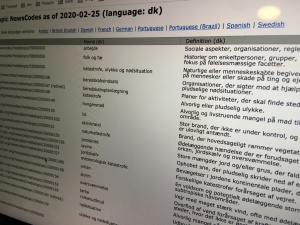 In late February we pushed the latest update to Media Topics, IPTC’s main controlled vocabulary for subject classification (also known as a taxonomy).
In late February we pushed the latest update to Media Topics, IPTC’s main controlled vocabulary for subject classification (also known as a taxonomy).
This release includes a translation of NewsCodes into the Danish language.
On behalf of the NewsCodes Working Group and its chair Jennifer Parruci, we would like to say thanks very much to Mette-Lene Østergaard and Mads Petersen from the Danish news agency Ritzau in Denmark for all their work on making the translation.
It’s available from all the usual places:
- The main IPTC Controlled Vocabulary server at cv.iptc.org, which includes both human- and machine-readable versions of all IPTC NewsCodes: http://cv.iptc.org/newscodes/mediatopic/
- HTML browsable view: https://www.iptc.org/std/NewsCodes/mediatopic/treeview/
- Graphical tree view: http://show.newscodes.org/index.html?newscodes=medtop&lang=dk&startTo=Show
- Downloadable Excel version: https://www.iptc.org/std/NewsCodes/IPTC-MediaTopic-NewsCodes.xlsx
The IPTC Media Topic NewsCodes vocabulary is now available in 9 languages: Arabic, British English, Danish, French, German, Portuguese, Brazilian Portuguese, Spanish and Swedish.
We are working with partners on several more language translations coming very soon. If you would like to work with us on contributing a new language translation of IPTC Media Topics or any other IPTC standard, please contact us!
We were very much looking forward to our IPTC 2020 Spring Meeting in Tallinn, Estonia, beautiful city on the Baltic Sea and home city of Brendan Quinn, Managing Director of IPTC. But unfortunately, circumstances mean that we can not hold the meeting in person this time.
Instead we are looking forward to hosting IPTC’s first ever virtual Spring Meeting!
We will be going ahead with the dates that we had planned: Monday May 11 to Wednesday May 13, but rather than having all-day sessions, we will be having sessions from 13.00 to 18.00 UTC on each day.
This meeting will include:
- The usual updates from our working groups including the Photo Metadata Working Group, Video Metadata Working Group, News Architecture Working Group, NewsCodes Working Group, News in JSON Working Group, Sports Content Working Group
- Speakers from IPTC Members such as Reuters, New York Times, Bloomberg and TT on related projects in their newsrooms
- Invited guest speakers from companies related to our standards and key topics
- The special topic focus for this meeting is “robojournalism” and automated media generation
- Because we know how attendees love the networking and interaction sides of our face-to-face meetings, we will have several sessions that aim to let attendees discuss issues with each other and encourage participation in side rooms and through other channels such as our Slack community.
All IPTC Members are invited to attend. For this virtual meeting, there is no cost for IPTC members to attend.
IPTC Member Delegates should look out for an email from Brendan Quinn containing the registration link, or see the event page on the IPTC Members-Only Zone for the registration link.
We are pleased to announce that we have updated our popular Quick Guide to IPTC Photo Metadata and Google Images document to cover the planned updates to Google Image search that we announced last week.
First published in October 2018 after the announcement that Google Images displays image credits based on embedded IPTC Photo Metadata, the Quick Guide has proved very popular as a quick instruction guide showing how photographers and image owners can add the correct metadata fields to their images in a way that ensures image rights information will be displayed in Google search results pages.
Now that Google’s updates to handle “licensable images” have been announced (in beta), we have added new sections to the document so everyone can see all of the IPTC Photo Metadata fields used by Google in one place. We also make clear which fields will be used by Google straight away and which fields will only be displayed after the public launch of the new feature.
All comments and suggestions to the document are welcome. Please post to the public iptc-photometadata discussion list or use the IPTC contact form if you would like to get in touch.
Categories
Archives
- February 2026
- January 2026
- December 2025
- November 2025
- October 2025
- September 2025
- August 2025
- July 2025
- June 2025
- May 2025
- April 2025
- March 2025
- February 2025
- January 2025
- December 2024
- November 2024
- October 2024
- September 2024
- August 2024
- July 2024
- June 2024
- May 2024
- April 2024
- March 2024
- February 2024
- December 2023
- November 2023
- October 2023
- September 2023
- August 2023
- July 2023
- June 2023
- May 2023
- March 2023
- February 2023
- January 2023
- December 2022
- November 2022
- October 2022
- September 2022
- August 2022
- July 2022
- June 2022
- May 2022
- April 2022
- March 2022
- February 2022
- January 2022
- December 2021
- November 2021
- October 2021
- September 2021
- August 2021
- July 2021
- June 2021
- May 2021
- April 2021
- February 2021
- December 2020
- November 2020
- October 2020
- September 2020
- August 2020
- July 2020
- June 2020
- May 2020
- April 2020
- March 2020
- February 2020
- December 2019
- November 2019
- October 2019
- September 2019
- July 2019
- June 2019
- May 2019
- April 2019
- February 2019
- November 2018
- October 2018
- September 2018
- August 2018
- July 2018
- June 2018
- May 2018
- April 2018
- March 2018
- January 2018
- November 2017
- October 2017
- September 2017
- August 2017
- June 2017
- May 2017
- April 2017
- December 2016
- November 2016
- October 2016
- September 2016
- August 2016
- July 2016
- June 2016
- May 2016
- April 2016
- February 2016
- January 2016
- December 2015
- November 2015
- October 2015
- September 2015
- June 2015
- April 2015
- March 2015
- February 2015
- November 2014